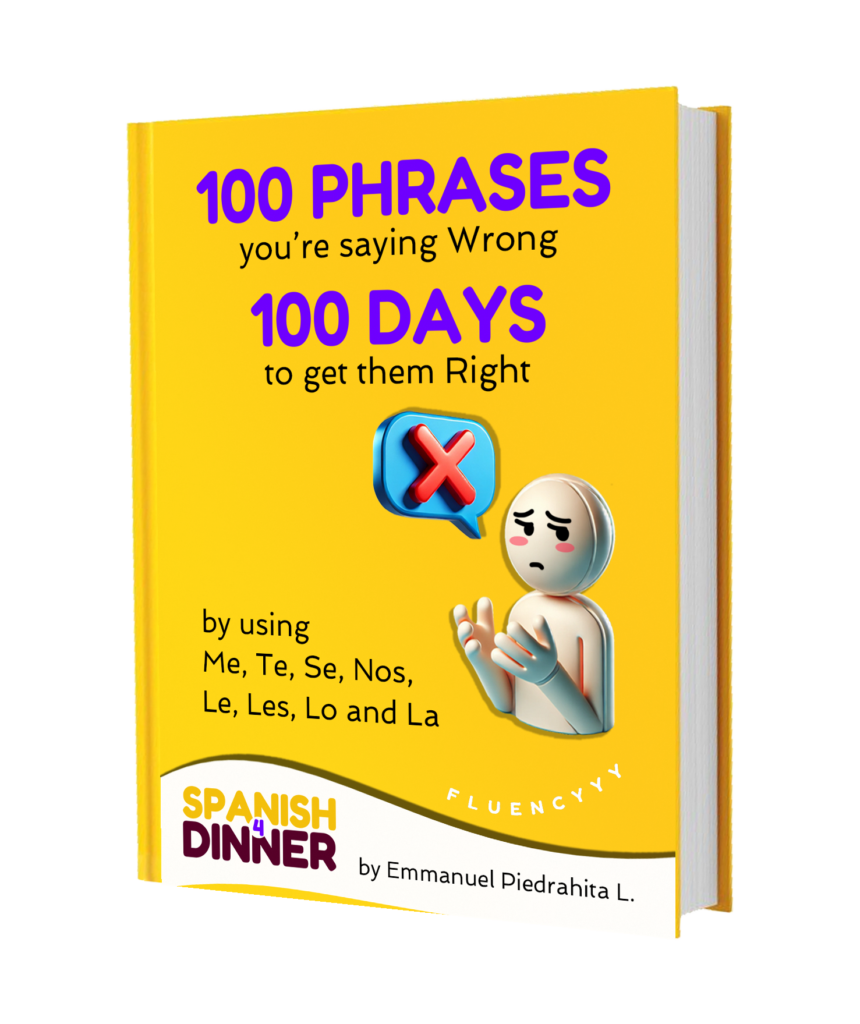Indirect object examples – ‘me’ and ‘a mí’
Present simple tense – affirmative examples
1. My friends call me Jenni.
Mis amigos me llaman a mí Jenni
Or simply: Mis amigos me llaman Jenni
2. My mom always listens to me.
Mi mamá siempre me escucha a mí
Or simply: Mi mamá siempre me escucha
3. My mom calls me every day.
Mi mamá me llama a mí todos los días
Or simply: Mi mamá me llama todos los días
4. They help me with homework.
Ellos me ayudan a mí con las tareas
Or simply: Ellos me ayudan con las tareas
5. My girlfriend understands me perfectly.
Mi novia me entiende perfectamente a mí
Or simply: Mi novia me entiende perfectamente
6. My grandma cooks for me when I visit her.
Mi abuela me cocina a mí cuando la visito
Or simply: Mi abuela me cocina cuando la visito
7. The kids listen to me when I speak.
Los niños me escuchan a mí cuando hablo
Or simply: Los niños me escuchan cuando hablo
8. My boss gives me a lot of responsibilities.
Mi jefe me pone muchas responsabilidades a mí
Or simply: Mi jefe me pone muchas responsabilidades
9. My sister lends me her clothes.
Mi hermana me presta su ropa a mí
Or simply: Mi hermana me presta su ropa
10. My friends invite me to all the parties.
Mis amigos me invitan a mí a todas las fiestas
Or simply: Mis amigos me invitan a todas las fiestas
When to use a mí, and when is it not necessary?
Referring back to example 5, “My girlfriend understands me perfectly”, imagine you’re talking to your best friend. He’s a bit upset because he and his girlfriend aren’t communicating well. He says she doesn’t always understand him. You respond by saying that your relationship is great and that your girlfriend always listens and understands you.
🔹Jake: “My girlfriend doesn’t always understand me.”
You: “That’s tough. On the contrary, my girlfriend always understands me.”
🔹Jake: Mi novia no me siempre entiende.
You: Es muy duro. Por el contrario, mi novia siempre me entiende a mí.
We use a mí in our reply to highlight the contrast between someone who isn’t being understood and ourselves — the ones who are understood by our partner.
However, it’s not strictly necessary to include a mí. Leaving it out won’t change the meaning, the level of formality, or how natural the sentence sounds in everyday conversation.


Still stuck in translator mode when speaking Spanish? Time to upgrade!
Our brand new course is here to help you use pronouns like me, te, nos, le, les, lo, and la with confidence — and sound way more fluent.
Present simple tense – negative examples
1. My brother doesn’t talk to me.
Mi hermano no me habla a mí
Or simply: Mi hermano no me habla
2. They don’t write to me.
Ellos no me escribren a mí
Or simply: Ellos no me escriben
3. My boss doesn’t listen to me.
Mi jefe no me escucha a mí
Or simply: Mi jefe no me escucha
4. Your friends don’t know me.
Tus amigos no me conocen a mí
Or simply: Tus amigos no me conocen
5. The teacher doesn’t explain things clearly to me.
La profesora no me explica las cosas claramente a mí
Or simply: La profesora no me explica las cosas claramente
6. My parents don’t let me go out.
Mis padres no me dejan salir a mí
Or simply: Mis padres no me dejan salir
7. Your sister doesn’t pay attention to me.
Tu hermana no me presta atención a mí
Or simply: Tu hermana no me presta atención
8. My classmate doesn’t answer me.
Mi compañero no me responde a mí
Or simply: Mi compañero no me responde
9. She doesn’t send messages to me.
Ella no me envía mensajes a mí
Or simply: Ella no me envía mensajes
10. Your dog doesn’t obey me.
Tu perro no me obedece a mí
Or simply: Tu perro no me obedece
Present simple tense – question examples
1. Do you understand me?
¿Tú me entiendes a mí?
Or simply: ¿Tú me entiendes?
2. Do you listen to me when I speak?
¿Tú me escuchas a mí cuando hablo?
Or simply: ¿Tú me escuchas cuando hablo?
3. Does she know me well?
¿Ella me conoce bien a mí?
Or simply: ¿Ella me conoce bien?
4. Who helps me with this task?
¿Quién me ayuda a mí con esta tarea?
Or simply: ¿Quién me ayuda con esta tarea?
5. Do you truly respect me?
¿Tú en verdad me respetas a mí?
Or simply: ¿En verdad me respetas?
6. Do they consider me part of the team?
¿Ellos me consideran a mí parte del equipo?
Or simply: ¿Ellos me consideran parte del equipo?
7. Who understands me better—mom or dad
¿Quién me entiende mejor a mí: mi mamá o mi papá?
Or simply: ¿Quién me entiende mejor: mi mamá o mi papá?
8. Why doesn’t she ever talk to me directly
¿Ella por qué nunca me habla directamente a mí?
Or simply: ¿Ella por qué nunca me habla directamente?
9. Do you hear me?
¿Tú me escuchas a mí?
Or simply: ¿Me escuchas?
10. Do you recognize me?
¿Tú me reconoces a mí?
Or simply: ¿Me reconoces a mí?

🎯 Want to use Spanish object pronouns like a true native speaker?
At Spanish4dinner, we’ve got you covered when it comes to mastering Spanish pronouns.

Grab your free 100 phrases you’re saying wrong 100 days to get them right eBook and start building a habit that will make your Spanish sound more natural—just like a local!